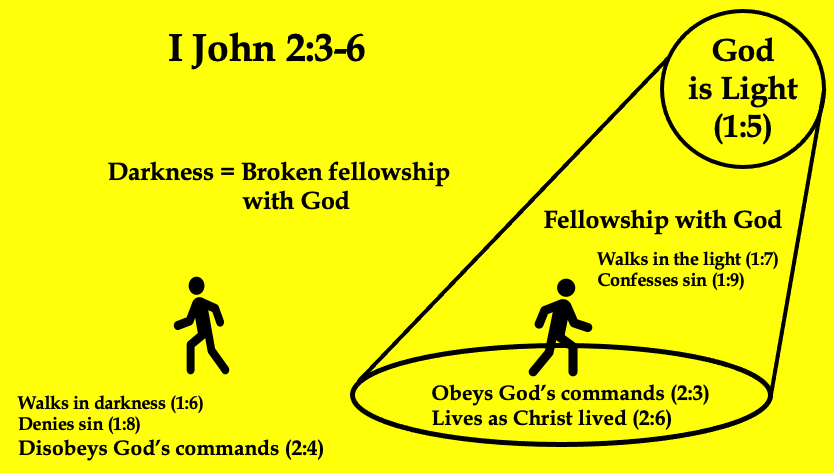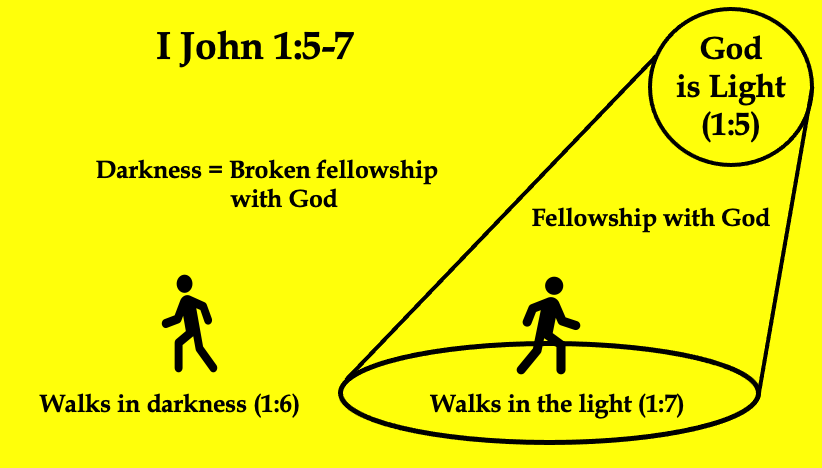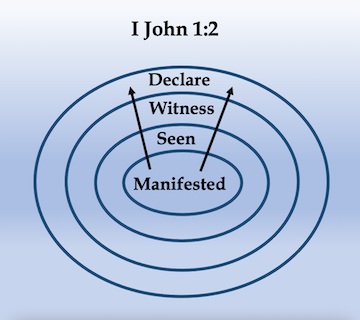“For all that is in the world—the lust of the flesh, the lust of the eyes, and the pride of life—is not of the Father but is of the world.” I John 2:16
We learned last time that loving the world can disrupt our fellowship or closeness with God (2:15). Satan has designed the world system to draw Christians away from their love for the Lord and His Word. The world is one of three enemies that can disrupt our fellowship with the Lord. The other two enemies are our sinful nature (I John 1:5-2:2) and the Devil (I John 2:18-28). The apostle John now explains what makes the world so enticing. “For all that is in the world—the lust of the flesh, the lust of the eyes, and the pride of life—is not of the Father but is of the world.” (I John 2:16). The appeal of the world is three-fold.
The Bible records a time the Devil used these three allurements of the world to entice the first people away from God. In Genesis 3:1-5, the Devil spoke through the serpent to weaken Eve’s resolve to obey the command God gave her and Adam not to eat from the tree of the knowledge of good and evil (cf. Gen. 2:17). Three times Satan attacked God’s Word by doubting it (Gen. 3:1), denying it (Gen. 3:2-4), and distorting it (Gen. 3:5). After these three assaults against God’s Word, Eve is too weak to resist the world, so Satan dangles the three enticements of the world found in I John 2:16 to finish off Eve (Gen. 3:6): 1
1. “when the woman saw that the tree was good for food” (lust of the flesh).
2. “that it was pleasant to the eyes” (lust of the eyes).
3. “and a tree desirable to make one wise” (pride of life).
Keep in mind that Adam and Eve did not have a sin nature when God created them like we have today (Gen. 1:26-31; 2:23-25). There was no sinful flesh in them before they disobeyed God. That came after their disobedience so that all people (except Jesus Christ – 2 Cor. 5:21; Heb. 2:15; I Pet. 3:18) are born with a sinful nature (cf. Psalm 51:5; Rom. 3:9-23; 5:12-19) which Satan entices with his own attacks and the world’s allurements.
Even today Satan’s main strategy is to attack God’s Word. Anderson explains when he writes, “The rise of Rationalism erodes the confidence of Christians in the infallibility of God’s Word. As their confidence diminished, so did the strength of Christianity in the western world. Even today the strength of the Christian Church is not in Europe and the Western Hemisphere. It’s in Africa, Indonesia, and China where attacks against the Word of God by skeptics have not weakened the Church. Remember from Ephesians 6 that our enemy’s first tactic in order to defeat the Christian soldier is to knock the sword of the Spirit (God’s Word) out of his hand. The young men of 2:14 were strong because the Word of God was abiding in them.
“The Word of God was abiding in Jesus when he was tempted by the devil (Matt 4:1-11). When the devil appeared before Christ, he was again twisting and distorting God’s Word in his attempt to disarm Jesus. He dangled the world system in front of Christ: 1) Lust of the flesh—Jesus was hungry after forty days of fasting when the devil asked Him to turn the stones into bread; 2) Lust of the eyes—the devil showed Jesus this present world where Satan reigns if Jesus would worship him; and 3) Pride of life—the devil tempted Jesus to prove how important He was to God’s kingdom program by throwing Himself off the temple just to watch the angels come to rescue Him. But in each case Jesus overcame the temptation of the devil and this world by His own resolve to be faithful and by a proper use of God’s Word: ‘It is written … It is written … It is written.’ The principle of overcoming lust is transparent: The war against the lusts of this world is won by God’s Word!” 2
Let’s take a closer look at the three-fold appeal of Satan’s world system in I John 2:16:
1. “the lust of the flesh” (hē epithymia tēn sarkos): The word for “lust” (epithymia) refers to a “great desire, longing, craving… for good things (Phil. 1:23; Luke 22:15; I Thessalonians 2:17)” or “something forbidden” (I John 2:16). 3 In the New Testament, it is often used of “an evil desire, … something which is deceitful (Ephes. 4:22), defiling (2 Pet. 2:10), and controlling (1 Pet. 1:14). We never read of these lusts in heaven. In heaven there will be no lust because there will be no sinful nature within us.” 4
The word for “flesh” (sarkos) can refer to the material covering the bones of a human or animal body (I Cor. 15:39), the human physical body (Acts 2:31; Ephes. 5:29), or more likely here to the sin nature in humans (Rom. 7:18, 25; 8:4-8; Gal. 5:16-21; Ephes. 2:3). 5
Since the word “lust” can refer to a desire or longing for good or forbidden things, Evan’s suggestion that Christians possess legitimate desires which the world promises to satisfy in illegitimate ways 6 is not far-fetched. For example, all people have a legitimate desire to eat. There is nothing sinful about wanting to eat. But the world promises to satisfy our hunger through gluttony (Deut. 21:20; Prov. 23:20-21). Every person has a legitimate desire for sexual intimacy. There is nothing wrong with wanting sexual closeness if it is within God’s parameters of marriage between one man and one woman (Genesis 2:24-25; Matt. 19:4-6; Song of Songs). However, the world promises to satisfy this legitimate desire for intimacy through sex outside of marriage (Prov. 2:10-19; 5:1-23; 6:20-35; 7:1-27; I Cor. 5:1-7:9; et al.).
Consider how the world entices Christians to participate in sex outside of marriage through pornography. Pornography encourages lust. Jesus taught that when a man lusts for a woman he has already committed adultery with her in his heart (Matt. 5:27-28). According to Jesus, mental adultery is just as sinful as physical adultery.
In his book, “The Freedom Fight: The New Drug and the Truths that Set Us Free,” Ted Shimer notes the following about pornography in America in a chapter entitled “Sexualized Society”: 7
“Sexualization is everywhere: in children’s TV shows, in movies, in ads, in video games, in retail, in marketing campaigns, throughout social media. An endless amount of porn is available in everyday places: Snapchat, Twitter, and emails. 8 Girls are often pressured by society to be more sexually attractive, to wear tighter, more revealing clothing, post sexier images, and sext. 9
“Movies and TV shows deliver sex now more than ever. Kids under seventeen are not allowed to see Rated R or NC-17 in theatres, but they do on Netflix all the time. Netflix’s mature rating (MA) often exceeds the R rating and includes graphic sexual content that used to be reserved for NC-17. 10
“Today, 61% of Netflix’s content has this mature rating. 11 What used to be considered pornography now describes much of their content available to any kid with a mobile device. Millions of people, including children whose families don’t even have Netflix, just use a friend’s account to watch all the shows their friends are talking about. 12
“The appetite for sexualized media is growing. In 2013, only 31% of Americans believed that pornography was morally acceptable. Now almost half do, including 67% of men ages eighteen to forty-nine. 13 Even the news is sexualized. Major news outlets regularly run news articles highlighting a supermodel or celebrity in her bikini. Since when is that news? Since it gets clicks and attracts advertisers.
“Sex sells. The sex-crazed society is all around us. The 2020 Super Bowl Halftime show reflected our sexualized society. On the same stage that showed women in stripper outfits pole dancing, children were also performing. Our culture celebrates and worships sexual immorality, and the conditioning starts young.” 14
How does this impact Christians in the USA? Shimer states in other parts of his book, “It might come as no surprise that there is virtually no difference in monthly porn use among non-Christian men (65%) versus Christian men (64%). 15 In fact, it might even be worse than the published statistics indicate. The Freedom Fight recently conducted a survey of over 750 Christian college men from over thirty different campuses across the country. Each of the men we surveyed was involved in a campus ministry, and each considered their faith to be a vital element in their lives. Many of them were leaders in their ministries. What we found was alarming – 89% of the growing Christian men we surveyed watch porn, at least occasionally. More than six in ten view it at least weekly. More than half of these practicing Christian men say they are addicted to pornography. 16
“The Freedom Fight’s recent survey of over 550 Christian women in ministry from over thirty university campuses across the US showed that 51% are watching porn at least occasionally. These aren’t just any college women either. These women are practicing Christians, involved in campus ministry, and many of them are in leadership positions. Though their faith is important to them, pornography remains a part of their lives.” 17
“Two out of three Christian men watch porn regularly. 18 Many of them feel bad about it, but few of them have an urgency and commitment to break free. In fact, less than one in ten of these men seek meaningful help. 19 How can so many Christians seem content to live in sin? The answer is shame and self-deception.” 20
While many Christian leaders are calling porn the greatest threat to the Church, 21 less than 7% of pastors provide solutions to help their people break free from porn. 22 Shimer believes the reasons pastors don’t address this issue is because they are either addicted to porn themselves, 23 they are unaware of the significance of the issue, 24 or because it is such an uncomfortable topic to address. 25
Pornography is just one example of “the lust of the flesh” which idolizes pleasure. In I John 2:16, the second enticement of the world is …
2. “the lust of the eyes” (hē epithymia tōn ophthalmōn): The world wants to draw us away from God through what our eyes see. Another word for this is called covetousness which is desiring or pursuing that which is not legitimate for you to possess. 26 Satan wants to use the world to desensitize us to God and His Word through what is visually appealing but not ours to desire or obtain.
While “the lust of the flesh” refers to desires that are prompted by the internal pressures of our sinful nature within, “the lust of the eyes” means a desire aroused in us by external objects or persons. 27 Whereas the lust of the flesh idolized pleasure, the lust of the eyes idolizes possessions. 28
Examples of “the lust of the eyes” may include desiring another person’s wealth or spouse (Exod. 20:17) or buying on credit. We see our neighbor drive into his driveway with a new Porsche and we think, “Got to have it!” We see a friend at school wearing a new outfit, and we say, “Got to have it!” We see a coworker get promoted and we say to ourselves, “Got to have it!” Wanting to keep up with the Joneses expresses this type of lust. The national debt of America, which amazingly is at 31.36 trillion dollars, 29 is an example of “the lust of the eyes.”
Proverbs 27:20 says, “Hell and Destruction are never full; so the eyes of man are never satisfied.” Advertisers understand that the eyes of people are never satisfied until they get the latest, the shiniest, and the most expensive. Their advertising campaigns during the Christmas season might as well say, “Covet this!” We will see TV commercials that insist we need that new appliance, car, insurance, or piece of clothing to be happy or fulfilled. Instead of our eyes focusing on Jesus (Heb. 12:2), they become fixed upon getting that next thing, person, or status we think we must have to be satisfied. The third enticement of the world is…
3. “the pride of life” (hē alazoneia tou biou): The word for “pride” (alazoneia) means “arrogance, pretentiousness, or boasting about self, possessions, or accomplishments.” 30
“‘Pride of life’ will be reflected in whatever status symbol is important to me or seems to define my identity. When I define myself to others in terms of my honorary [or earned] degrees, the reputation of the church I serve, my annual income, the size of my library, my expensive car or house, and if in doing this I misrepresent the truth and in my boasting show myself to be only a pompous fool who has deceived no one, then I have succumbed to what John calls the pride of life.” 31
Examples of the pride of life include boxer Muhammad Ali who often boasted about himself being the greatest, boasting in one’s possessions which is another way of keeping up with the Joneses, and boasting in one’s accomplishments (“Look what I did!”). Satan uses the contemplation of personal achievement (e.g., popularity, academic success, etc.) to produce an independent self-glorifying spirit that leaves God out of our lives.
I once heard a Bible teacher illustrate all three enticements of the world by referring to the breaking of the Tenth Commandment, “…You shall not covet your neighbor’s wife.“ (Exod. 20:17b). He said it may involve her physical attraction (“the lust of the flesh”), her visual appeal (“the lust of the eyes”), and after the adultery, the man may brag about it(“the pride of life”).
John makes it clear that none of these worldly enticements are “of the Father but” are “of the world” (I John 2:16b) which is “passing away” (I John 2:17). Therefore, Christians are to avoid these fleeting lusts.
The way to overcome these worldly lusts is by abiding in God’s Word. This is how Jesus defeated the Devil when He was tempted in the wilderness (Matt. 4:1-11). And this is how John’s readers would defeat Satan and his worldly allurements: “I have written to you, young men, because you are strong, and the word of God abides in you, and you have overcome the wicked one.” (I John 2:14b). We need the strength that comes from making our home in God’s Word.
Anderson writes, “Dr. Lewis Aberson, the Chief Pathologist in Akron, Ohio, has written an article in which he says there is more child abuse in America due to starvation than to battering. Can you believe that? After an autopsy of a six-month-old baby who died, Aberson and Samuel Gerber (the coroner) said these words: ‘While battered babies are seemingly a more common occurrence, this is not so. It is only that battered babies are more easily detected. Infant starvation is rarely seen while in progress. Acts of omission, whereby the child is deprived of adequate nutrition, are equally or more dangerous to the child’s welfare and equally culpable under the law.’
“Can you believe that in this country parents would starve their own children to death? Heinous and shocking as this crime may be, are we as shocked by the fact that spiritual malnutrition of children is far more rampant than physical malnutrition? There are churches all across our nation where the people in the pew rarely if ever even hear God’s Word, let alone feed upon it. I grew up in a church like that. Never heard anything from God’s Word except a two-minute reading now and then, and that was always from the Sermon on the Mount. No wonder I got sucked into the world system while still quite young. The war against the lusts of this world is won by God’s Word!” 32
Prayer: Father God, what a joy to be able to call You our Father because of Your great grace which saved us from hell forever the moment we believed in Your Son, Jesus Christ. We can easily be blinded by the allurements Satan uses in the world to make us think less about You and the world to come. Thank You for revealing more of Satan’s tactics so we can be more aware of our constant need for You and Your life-giving Word. Oh Father, help us abide in Your Word so we can have the strength and wisdom to resist the Devil and experience victory over him and his worldly enticements. Please forgive us precious Father when we do succumb to the lust of our flesh, the lust of our eyes, and the pride of our lives. We do not deserve Your goodness and mercy to us. But then again, we never have. Christ has earned our favor before You, and we are forever grateful to Him! In Jesus’ mighty name we pray. Amen.
ENDNOTES:
1. David R. Anderson, Maximum Joy: I John – Relationship or Fellowship? (Grace Theology Press, 2013 Kindle Edition), pg. 113.
2. Ibid., pp. 113-114.
3. Walter Bauer, A Greek-English Lexicon of the New Testament and Other Early Christian Literature: Third Edition (BDAG) revised and edited by Frederick William Danker (Chicago: University of Chicago Press, 2000 Kindle Edition), pg. 372.
4. Anderson, pg. 113.
5. Bauer, pp. 914-915.
6. Tony Evans, CSB Bibles by Holman, The Tony Evans Bible Commentary (B & H Publishing Group, Kindle Edition, 2019), pg. 2939.
7. Adapted from Ted Shimer, The Freedom Fight: The New Drug and the Truths that Set Us Free (Houston: High Bridge Books, 2020), pp. 122-
8. Ibid., pg. 122 states in footnote that daily porn consumption in US (2 billion pornographic emails sent daily), https://scribd.com/presentation/87502444/Porn-Facts
9. Ibid., cites https://www.verywellmind.com/damaging-effects-of-sexualizing-girls-4778-62
10. Ibid., cites https://endsexualexploitation.org/articles/netflix-nc17-r-rated-content/
11. Ibid., pg. 123 cites http://wwwmovieguide.org/news-articles/61-of-netflix-originals-have-mature-content-few-are-family-friendly.html
12. Ibid., cites https://www.vox.com/2019/4/8/18300256/netflix-password-sharing-14-percent-survey-content-experience-moffettnathanson
13. Shimer states, “In 2018, 43% of Americans said that pornography is morally acceptable. This is an increase of 12% in the last 5 years. So, it is a safe assumption that at the time of the writing of the book, this figure had risen to at least 45%, https://news.gallup.com/poll/235280/americans-say-pornography-morally-acceptable.aspx”
14. Ibid., pp. 122-123.
15. Ibid., pg. 20 cites Proven Men Porn Survey (conducted by Barna Group), located at https://provenmen.org/2014PornSurvey/
16. Ibid., pg. 21 cites 2019 Freedom Fight national Christian student survey involving over 550 women and 750 men from over 30 Universities across the U.S.
17. Ibid.
18. Ibid., pg. 58 cites 2014 Barna Group Survey at https://wwwprovenmen.org/pornography-survey-statistics-2014/
19. Ibid., pg. 58, also Shimer states on pg. 334, footnote #2, “Dr. Ted Roberts, the Founder of Pure Desire ministry and Host of the Conquer Series, who had helped people for over thirty years find freedom from pornography, in a correspondence on July 5, 2019, estimated that less than 10% of Christian men who are struggling with porn are seeking recovery in a meaningful way. He believes shame is the biggest factor keeping believers in the shadows.”
20. Ibid., pg. 58. Shimer also cites Dr. Samuel Perry who said in his July 3, 2019, email correspondence that his research led him to believe that Christian women under-report their porn use because of shame (pg. 334).
21. Ibid., pg. 87. Shimer also states that over half of pastors say porn addiction is the most damaging issue in their congregation, citing https://www.charismnews.com/us/73208-15-statistics-about-the-church-and-pornography-that-will-blow-your-mind (pg. 338).
22. Ibid., pg. 89 cites Barna Survey at https://www.charismnews.com/us/73208-15-statistics-about-the-church-and-pornography-that-will-blow-your-mind
23. Shimer notes that two separate anonymous surveys showed half of pastors struggle with pornography (pg. 89). He cites on pg. 338 that a 2002 Pastors.com anonymous survey of over 1,300 pastors showed that 54% viewed porn in the last 12 months and 30% last month. He also cites Samuel L. Perry’s 2019 book Addicted to Lust (pg. 30), where Perry states that an anonymous survey by Promise Keepers showed that 54% of pastors had viewed porn in the last seven days.
24. Ibid., pp. 89-91.
25. Ibid., pp. 91-92. It must be noted that Shimer does an excellent job addressing how to overcome these obstacles on pages 92-99. This is well worth your time to look over especially if you are wanting to see your church be part of the solution and not part of the problem concerning pornography.
26. Evans, pg. 2939.
27. Tom Constable, Notes on I John, 2022 Edition, pg. 50 cites Kenneth Graystone, The Johannine Epistles, New Century Bible Commentary series (Grand Rapids: Wm. B. Eerdmans Publishing Co., and London: Marshall, Morgan & Scott, 1984), pg. 75.
28. Ibid., pg. 50.
29. Retrieved on December 3, 2022, from https://fiscaldata.treasury.gov.
30. Zane C. Hodges; Robert Wilkin; J. Bond; Gary Derickson; Brad Doskocil; Dwight Hunt; Shawn Leach; The Grace New Testament Commentary: Revised Edition (Grace Evangelical Society, Kindle Edition, 2019), pg. 592.
31. Constable, pg. 51 cites Glenn W. Barker, “1 John.” In Hebrews-Revelation, Vol. 12 of The Expositor’s Bible Commentary 12 vols, Edited by Frank E. Gaebelein and J. D. Douglas (Grand Rapids: Zondervan Publishing House, 1981), pg. 322.
32. Anderson, pg. 114.









